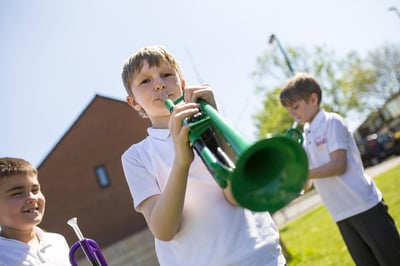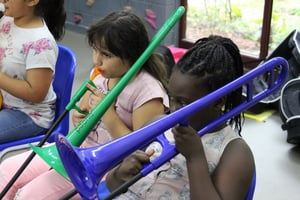
As manufacturers of trumpets and trombones, we are often asked which of the two is the easiest to learn!
This is actually quite a tricky question to answer, as you are comparing two different instruments, however very simple:
- the trombone is easier to get your first sounds on because it has a larger mouthpiece, which makes it easier to make a 'buzz' initially
- the trumpet is easier to get to grips with in terms of hold and posture and is easier for progression once you’re up and running, as valves are simpler to operate than a slide.
The question you should really be asking is - which one is going to be easier for you?!

Learning to play any musical instrument brings great personal and educational benefits, you're not very likely to hear someone say they wish they hadn't learned to play.
Brass instruments in particular do take a level of dedication, tenacity, resilience and some good old-fashioned hard work.
This is one of the reasons why they are so beneficial for children to learn, not to mention: teamwork, listening skills, motor skills, language development, maths skills, pattern learning, memory, empathy, presenting skills, confidence, broadening horizons etc, etc…
The genuine answer is that both instruments are really easy to play… if you love playing them! So, to help you decide which might be for you, here are a few questions for you to ask yourself...
Which of the two instruments' sound and music do you love the best?
You might want to refer to any great role models in the family, or if your family aren't musical, look further afield. Is there a brass band around the corner or a big band that practices upstairs at the local? Maybe you’ve seen something on the TV, or live in concert, in the town on a summer day, or heard a film score you love - like Star Wars!
Investing your time and energy into learning an instrument is most rewarding when it comes from excitement, and love for the music that you are making and hope to make. Music is a social activity and you’ve got to want to be around the people you are making music with, however, the great thing about playing is you can let the music do the talking if you don't want to!
You'll probably find you naturally veer towards styles or sounds in particular, from jazz to pop to orchestra, there's a huge variety! For example:
The setting you choose will have an impact on how to get to play; in an orchestral setting there’s lots of waiting around for both instruments but when you get your go you are usually given the chance of greatness. Jazz bands and big bands both have especially satisfying seats for the trumpet and trombone player and pop horn sections abound!
Both instruments get to play in the same breadth of genres, although some specialism might be needed later on in the trombone. Generally, you’ll play more tunes in a band as a trumpet player and the trombone is more often used in a supportive role.
If you’re in a country with a brass band tradition then learning the cornet as well as the trumpet, which is a common thing, gives the player amazing access to taking the lead and playing tunes, and there are also great parts for the trombone section.
Which instrument is a good 'fit'?
Size might matter!
The trombone is long and quite heavy, even if you choose a lightweight plastic instrument like our pBone, the player's arm needs to be able to reach all the way to the end of the slide to be able to play all the notes for a beginner band. Small trombones in Eb (alto or pBone mini) are available, but these do not fit easily into a traditional band setting so are more appropriate if the potential player is tiny and just HAS to play the trombone NOW!
Teeth can be an issue, in that without your front teeth down and stable, playing the trumpet might not be a good idea, as the mouthpiece rests wholly on the lips and any force is transferred to the teeth (the bigger mouthpiece of the trombone also sits on the gum area). Although the trumpet is easier to physically manage than the trombone a smaller player might find the weight an issue so a plastic trumpet or cornet can really help here.
Which musical role suits your personality?
It’s often thought, especially in band circles, that the 'brass section' is a single team, the fun crew friends who hang together. This is usually true to a certain extent but within the brass world trumpet and trombone players are not thought of as sharing the same characteristics (think formula one and world rally championship drivers - they do the same kind of thing, but they are different). From the brass players' perspective, in some ways, they are worlds apart!
 Trumpet players are usually leaders who like the spotlight and might well compete for it. They can function well as individual musicians or part of a team and are often interested in the minutia of the instrument (and can get a bit geeky about it).
Trumpet players are usually leaders who like the spotlight and might well compete for it. They can function well as individual musicians or part of a team and are often interested in the minutia of the instrument (and can get a bit geeky about it).
Trombone players are pack animals for sure and operate as a team as their default setting. The vagaries of the slide sometimes lead to a slightly more laid back, philosophical view on things. Of course, these are massive generalisations and thousands of exceptions of all kinds surround us in the brass world!
Either way, becoming a brass player will begin a lifetime fascination with the joy of music and the excitement of playing some of the most powerful and dramatic traditional instruments. The brass playing 'family' is large, loyal and supportive and many brass players find life-long friends amongst their fellow players, whichever you choose we wish you the best of luck!
Download our free eBook on the Easiest Instrument to Learn by completing the form below
Read More:
If you'd like to know a little more about either the trumpet or the trombone, check out our How to Play pages.
As an undergraduate Chris studied Jazz at Leeds College of Music and then became a member of the Advanced Studies, post-graduate performers course at the Royal Academy of Music and Principal Bass Trombone with the European Community Youth Orchestra under Claudio Abbado. He then spent 25 years as a busy freelance performer based in both London and the North of England working with a wide variety of ensembles and artists, including being a member of Grimethorpe Colliery Band, The British Philharmonic Orchestra, Dame Shirley Bassey’s Orchestra and the Creative Jazz Orchestra.
Alongside this Chris has worked extensively in all areas of music education, latterly as a leading deliverer and trainer in informal, large group practice. This included roles as Leader in Wider Opportunities at Hertfordshire Music Service, Leader of Instrumental Development for Derbyshire City and County Music Partnership and as a face to face trainer on the Trinity Guildhall/Open University “Whole Class Instrumental Learning” national training program.
He became a key member of the team that created pBone, the plastic trombone in 2011/12 and has been involved with pBone Music in various roles since then. Chris is currently the Director of Creativity and Innovation for the company, a role that includes overseeing product development and improvement, quality and education.
